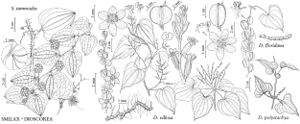Difference between revisions of "Smilax tamnoides"
Sp. Pl. 2: 1030. 1753.
FNA>Volume Importer |
FNA>Volume Importer |
||
| Line 63: | Line 63: | ||
|publication year=1753 | |publication year=1753 | ||
|special status= | |special status= | ||
| − | |source xml=https://jpend@bitbucket.org/aafc-mbb/fna-data-curation.git/src/ | + | |source xml=https://jpend@bitbucket.org/aafc-mbb/fna-data-curation.git/src/f6b125a955440c0872999024f038d74684f65921/coarse_grained_fna_xml/V26/V26_998.xml |
|genus=Smilax | |genus=Smilax | ||
|species=Smilax tamnoides | |species=Smilax tamnoides | ||
Revision as of 19:34, 24 September 2019
Vines; rhizomes knotty, short. Stems perennial, climbing, branching, terete, to 7+ m × 9 mm, woody, glabrous, with prickles proximally, prickles usually absent distally; prickles blackish, unequal, 3–10+ mm, bristly, flexible. Leaves ± persistent in southern part of range, deciduous in north; petiole 1–2 cm; blade green, drying to light olive-gray, ovate-lanceolate, ovate, or sometimes pandurate, prominently reticulate, thin, 5–13 × 3–10 cm, not glaucous, glabrous (to prickly on major veins abaxially), base rounded to cordate, margins entire apically, minutely serrulate basally, thin, flat, not banded, not lobed, apex pointed. Umbels many, axillary to leaves, to 25-flowered, open to dense, spherical; peduncle often drooping, 1.5–6.5 cm. Flowers: perianth green to bronze; tepals 4–5 mm; anthers ± equaling to shorter than filaments; ovule 1 per locule; pedicel 0.4–1.2 cm. Berries black, globose, 6–10 mm, not glaucous.
Phenology: Flowering May–Jun.
Habitat: Wet to dry woods, thickets, bottomlands
Elevation: 0–400 m
Distribution

Ont., Ala., Ark., Conn., Del., D.C., Fla., Ga., Ill., Ind., Iowa, Kans., Ky., La., Md., Mass., Mich., Minn., Miss., Mo., Nebr., N.J., N.Y., N.C., Ohio, Okla., Pa., S.C., S.Dak., Tenn., Tex., Vt., Va., W.Va., Wis.
Discussion
Smilax tamnoides is marked by its dark, flexible, and unequal bristles and leaves with minutely serrulate margins basally. The far-western S. californica appears to be closely related but lacks the serrulate margins of the leaf bases.
Selected References
None.
